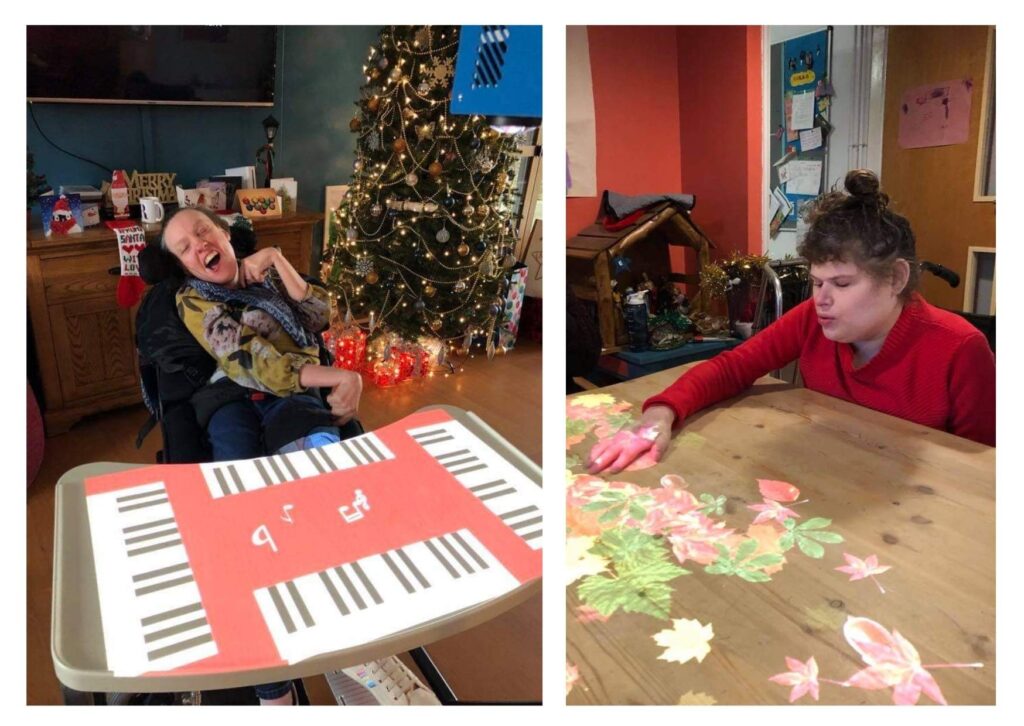Social-Ability are proud to be working with FitzRoy, a leading UK learning disability care group. We spoke to Alexa Sizeland, Activity Co-ordinator and Learning Disability Nurse, at The Pastures in Hales in Norfolk.
Q. Can you tell us a bit about The Pastures?
Alexa: We have 11 residents, ageing from 23 to 80 years old, who live in our 3 bungalows. They are supported by 10 or 11 staff members who are on shift at any given time.
We have some with acute care needs requiring 24-hour care, some are non-verbal and many have learning disabilities. We have some residents with nursing needs and mental health issues, and we have some living with autism who have very short attention spans.

Q. Tell us a little about your time with the Happiness Programme.
Alexa: We’ve had the Happiness Programme for about 2 years. When we started with it, we used it in a lot of different ways, exploring its uses and its benefits. It’s intuitive and easy to use and so uptake was quick. Almost immediately, our residents started to identify their own preferences – the Sweetshop and Money Bank games were instant hits!
We have 5 residents in wheelchairs which requires specially adapted rooms. For example, reaching out to tables for activities proves difficult, especially in groups. The interactive projector has been great for these residents as the games are just as easily played on the wall and floor. This has led to some quality time for these residents, spent engaging with the games as well as each other socially.

Q. Do you have any resident stories you could tell us about?
We’ve got sisters in their fifties living with Rett syndrome – a rare genetic disorder that affects brain development, resulting in severe mental and physical disability. They have family from Ireland, and they absolutely love Irish Folk Radio. You can see the eye movement and engagement whenever they hear it.
Given the spectrum of needs we cater for, it’s not always about physical movement or behaviour change. It can be more subtle than that and as a carer and nurse you can recognise changes in facial expression, body language and eye movement. You can tell when someone is engaged and watching even without the physical cues.
Because we can get small groups playing the games together, it builds social interaction – something which can be difficult to do with other activities. For those that need 1-2-1 activities, we use it with a curved table, allowing us to get the resident close enough to the lights to be immersed in the experience. This makes a real difference, and the music-based games are very popular.
It’s helped a lot in reducing distress and bringing about a sense of calm in them both.
We also have a 24-year-old man living with autism. He’s tall and energetic. As a member of staff, it’s about being organised as he has a very short attention span meaning we need everything set up beforehand. He enjoys Balloon Pop and the more physical games.
He becomes quite physically engaged – and it’s obvious to him what he needs to do. Typically, he’ll sit and do an activity for 3-4 minutes. Whilst sat playing these games, that can double to 7 or 8 minutes, and you can see him smiling a lot and enjoying himself. The sensory experience and time sat down is valuable for someone like him.
Finally, we have 1 lady who knows exactly which games she wants to play. She becomes really focused and her hand-eye coordination is excellent. She’ll often play for quite a while.
Q. How do you try to maximise the benefits of the Happiness Programme?
Alexa: we try to minimise other distractions. For instance, we find closing the blinds and turning the lights off really helps. It improves focus and the colours stand out even more against a dark background.
We’ve also expanded it across the staff so that anyone can help run a session. This helps especially at busy periods. A good example is at the start of the week when there’s a lot to do. It gives the residents a great activity and can support the staff in doing everything they need to.
Q. How would you sum up the Happiness Programme at the Pastures?
Alexa: It’s brilliant – it’s so simple. It’s easy to update with the latest games. It suits all ages and needs and it’s easy to use. It produces so much interaction and conversation and enables personalisation of activities and quality time. I really do recommend it.

Copyright © 2021 Social-ability. All Rights Reserved.